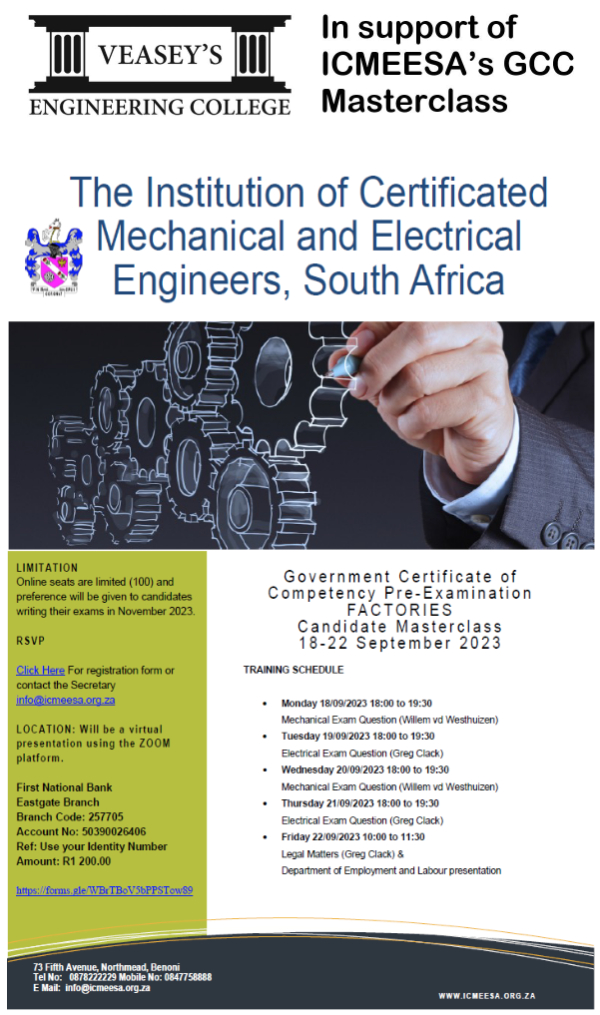
General (11)
Privacy Policy
We at AM-Tech Consulting Engineers and the Terotechnica Asset Management College are serious about our responsibility in securing the integrity and confidentiality of your personal information in our possession. We have taken all reasonable and technical measures to prevent the:
- Loss of and/or the unauthorised destruction and/or
- Unlawful access to and/or processing of your personal information.
We will in no way provide others with the confidential information you share with us.
You can navigate to our Home Page if you wish.
A PDF Copy of this page is also available.
Training and Good Maintenance
Why would investment in training pay off in any field? And, is same true for Physical Asset Management and Industrial Maintenance? Let us shortly investigate why training is important by first listing the more obvious effects of training, and then secondly list the less obvious, but even more inportant reasons to invest in training:
| The obvious effects of training: |  |
|
|
||
| The less obvious reasons to invest in training: |  |
|
|
We live in a time of high economic risk
Maintenance is not spared the magnifying glass of cost cutting, as it is one of the bigger contributors of business cost. It thus has to be as efficient as it can be.
And there is no efficiency measure as good as a competent work force. Employing the best maintenance technology, philosophies and techniques can of course do much. But all of these are only as good as the people who drives them, and those who implement their outcomes.

Peter Senge promotes the idea of a Learning Organisation to foster innovation at every level of the business. Although such a Learning Organisation involves much more than training, training is at its foundation.
We thus believe that maintenance training is and will be one of the major drivers of maintenance success. And consequently business success....
Because of this it is our view that it is inevitable that the traditional engineering departments at universities will have to be augmented by Maintenance Engineering departments. This college is a stepping stone in that direction.
| Additional information: | |
A short history of Terotechnica Maintenance College
The Terotechnica Maintenance College is a division of M-Tech Consulting Engineers (Pty) Ltd.
M-Tech was founded as a maintenance consulting company. However, maintenance training became the main activity in 1991. This was after it became clear that industry has a great need for maintenance training.
The Terotechnica Maintenance College has trained thousands of Maintenance Practitioners at different levels in the industrial organisation in the Art and Science of Maintenance Engineering over the 19 years of its existence.
The name Terotechnica Maintenance College was registered in 2003. The name is derived from the name Terotechnology, which is a historic name given in 1969 by a commission of enquiry into maintenance. Their suggestion was that the name Terotechnology should be used for what has come to be known as life cycle management.
The name Terotechnica was used in the 80's for a later discontinued maintenance journal. It is thus a history rich name, which we are proud to bear.
The college now offers tuition at three different levels: Diplomas, Certificates, and Short Courses.
| Additional information: | |

Dr Jasper L. Coetzee
Welcome by the Principal of Terotechnica Maintenance College
"I hereby wish to extend a heartiest welcome to maintenance practitioners and would be practitioners to our world of imparting Asset Management / Maintenance knowledge to others. We have, as our M-Tech website states, a passion for maintenance, maintenance people, and their empowerment to practice maintenance excellently. Enjoy your study into the new and old realities of the battle against failure, and then go and 'just do it'."
Also see our philosophy
| Additional information: | |
Maintenance success elements
To understand our philosophy regarding maintenance training, it is essential to understand what we regard to be the important elements ensuring maintenance business success, which are shown in the picture on the right of the page.
 The following seven elements, which are shown in the figure, should be well developed for a maiontenance organisation to serve the industrial business well:
The following seven elements, which are shown in the figure, should be well developed for a maiontenance organisation to serve the industrial business well:
1. A well systemised organisation
2. Proper equipment life-cycle management
3. A good maintenance operational system
4. The implementation of the correct level of maintenance technology
5. A 'deep' level of maintenance expertise (at all levels of maintenance operations and management)
6. Well designed maintenance logistics
7. A high level of development of personnel
If all these are in place, the maintenance function will support the organisation well in achieving its production and income goals.
Also visit our Qualifications Offered page for more detail regarding the 7 points listed above.
We believe that Maintenance Engineering is moving towards being an own Engineering Discipline in its own right, both at undergraduate and graduate levels.
The diploma and other courses that we present are a necessary stepping stone in that direction.
As a part of the logical outflow from this philosophy, our Managing Director is also involved in postgraduate tuition and research at the University of Pretoria.
| Centre for Asset Integrity Management | Additional information: | |
Save with in-house courses
Some organisations find it beneficial to bring us to the students, instead of the students to us. The travel and subsistence is certainly cheaper for one or two lecturers than for a whole group of your people, and there is an attractive discount for in-house courses with more than 10 students.
At some occasions organisations have even endeavoured to arrange a local group course, where they arrange a quasi-public course with students from other organisations in their city/town also attending.
 We require a minimum of five students for an in house course.
We require a minimum of five students for an in house course.
The cost per student for in-house courses with between 5 and 10 students the same as the advertised rate for our public courses in Pretoria. To this is added the cost of travel and subsistence for our lecturer(s).
Above ten students a discount of 20% applies on the advertised rate for our public courses in Pretoria (the cost of the travel and subsistence of our lecturer(s) will still apply).
Please contact our Registrar for a booking.
Telephone (016) 932 1629 or (012) 548 6096 or 082 855 8016
E-mail: This email address is being protected from spambots. You need JavaScript enabled to view it.
Please Note: Conditions of Entry and Payment Terms on the Administration page.
More...
Rules for international study
Where international students (typically from other African countries) attend our public courses, the same prices/conditions naturally apply that is applicable to South African students. We may however in some cases strictly require up front payment.
Where international students wish to do coursework on a distance study basis, the same rules as that for local study applies, apart from mailing cost which will be determined on a case by case basis. To allow for international currency fluctuations, the cost of courses in such cases will be charged in US Dollars:
- Two day course $ 600
- Three day course $ 900
- Four day course $ 1200
- Five day course $ 1500
- Diploma $ 6000
The mail cost will be determined an a case by case basis. See the contact details of our course administrator below.
In the case of international in house courses, the conditions on our In house courses page apply. Prices may be escalated to allow for extra travel time and inconvenience to lecturers.
Please contact our Registrar for a booking/quotation.
Telephone +27 16 932 1629 or +27 12 548 6096 or +27 82 855 8016
E-mail: This email address is being protected from spambots. You need JavaScript enabled to view it.
Please Note: Conditions of Entry and Payment Terms in the Administration page.
| Additional information: | |












